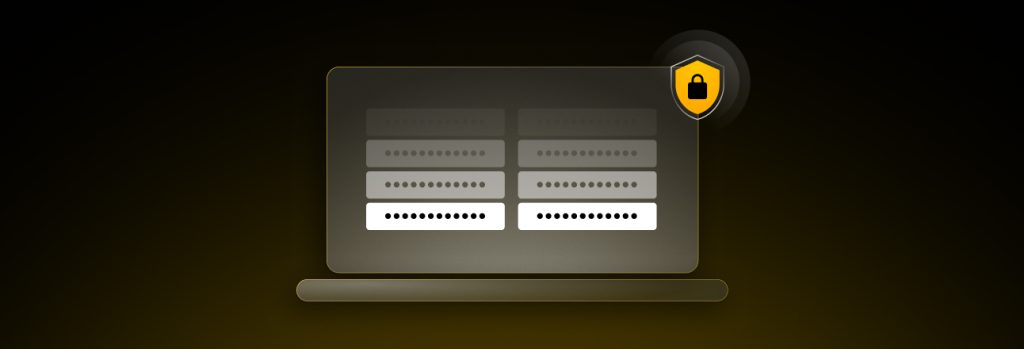The best and most secure way to store cryptocurrency private keys, passwords and mnemonic phrases is in a password manager. A password manager encrypts all data, making it a secure option for storing what you need to access your cryptocurrency without it getting into the wrong hands.
Read on to learn more about cryptocurrency and what you can do to better protect yours.
What is Cryptocurrency?
Cryptocurrency, such as Bitcoin, is a digital currency that uses cryptography to make transactions secure. Cryptocurrency uses a public-private key pair and a public ledger of transactions called a blockchain. The blockchain is a record of all the transactions made and held by the cryptocurrency holder. The public key is given out as a cryptocurrency “address.” The private key is used to cryptographically sign messages to prove that you own any balance that may be stored at a specific public address.
To transfer cryptocurrency from one address to another, the owner uses their private key to cryptographically sign the transaction which is then confirmed and incorporated into the blockchain. By examining the blockchain, anyone can determine how much currency is stored at a specific address, or at any point of time in the past. The public key can be freely given out in order to facilitate transactions to your wallet, while the private key must be kept secure at all times.
How Do People Store and Transfer Cryptocurrency?
The private key makes it possible to initiate transfers of cryptocurrency from a particular address. Keeping the cryptocurrency private key, passwords and mnemonic phrases secure is essential to protecting your cryptocurrency balances. Anyone on the internet with access to the private key or anything else related to your cryptocurrency can initiate transactions of any balance held in the corresponding public address.
Cryptocurrency is typically stored in these ways:
- A digital wallet service, also known as a custodial wallet
- A wallet application running on the end-user’s device
- A wallet file stored in offline electronic media
The Risks of Insecurely Storing Cryptocurrency Private Keys
Many online cryptocurrency wallets suffer from a major flaw: the wallet provider must have access to your wallet private key in order to initiate transactions on your behalf. It’s impossible for digital wallet services to initiate blockchain transactions without the secret key. Giving the secret key to a digital wallet means you must trust the digital wallet to keep your secret key secure.
Even worse, the secret key must be kept online and accessible for the wallet to initiate transactions – where vulnerabilities, such as meltdowns, can be used by cybercriminals to potentially steal cryptocurrency private keys. A meltdown attack exploits vulnerabilities found on operating systems that allow cybercriminals to gain access to all kinds of data while going undetected. The only way to keep yourself protected from this type of attack is by making sure you keep your systems and software up-to-date so they have the latest security patches.
What if I Lose My Private Key?
Private keys are far too long and complex for most people to remember. It is common for people to lose their private key. If that happens and it isn’t stored in a safe place such as a password manager or secure wallet, you’re unfortunately out of luck – you can’t reset it like a password. Without your private key, access to your cryptocurrency will be denied and redeeming it for goods, services or cash will be impossible. Losing your private key means losing access to your identity and digital assets.
Other online cryptocurrency services require users to transfer cryptocurrency to a wallet controlled by the service. Users must ultimately trust the wallet service to track how much cryptocurrency is stored in their account. In many ways, these services operate like a traditional bank. Account balances for each user must be kept online and accessible – making them vulnerable to manipulation by malicious employees, cybercriminals or seizure by the government. Many of the security and anonymity benefits of holding funds in cryptocurrency are lost by using online cryptocurrency wallet services. If your passkey were breached or stolen, someone could use it and pretend to be you.
Recent history is rife with examples of fraud and breaches of online cryptocurrency wallets and cryptocurrency services. Cryptocurrency will continue to grow as a target for cybercriminals as it increases in value and interest.
How Can I Protect My Cryptocurrency From Cybercriminals?
Instead of relying on a vulnerable online wallet, some people opt for an offline storage method. The problem that arises from offline or paper wallets is physical security and accessibility. Anyone with physical access to the offline wallet potentially has access to the currency stored in that wallet, and thus, it must be protected and secured like any other valuable physical asset, such as keeping it in a bank safety deposit box. However, a secret key stored on a flash drive or printed on paper wallet sitting in a safety deposit box is not conveniently accessible.
Luckily, there is a solution to protecting your cryptocurrency.
The Best Solution for Securely Storing Cryptocurrency
The best solution for securely storing your cryptocurrency private keys, passwords and mnemonic phrases is a password manager such as Keeper Password Manager, which was created to securely store, backup, and synchronize passwords and private keys. Keeper uses zero-knowledge AES 256-bit encryption. The keys used to encrypt and decrypt the passwords or keys stored in your Keeper vault are derived on your device from your master password. Since the keys are derived on your device and never leave, neither Keeper, nor anyone else, has the ability to decrypt any data stored within your vault. Everything stored in Keeper is encrypted at the record-level, which protects your cryptocurrency even in a worse case scenario.
Keeper offers many of the convenient benefits of online wallets and online cryptocurrency services while allowing you retain the security benefits of an offline wallet by keeping control over your cryptocurrency private keys. By using a product with zero-knowledge architecture, cryptocurrency wallets, keys or credentials can be securely backed-up or synchronized across multiple devices and accessed from anywhere.
A password manager helps you avoid losing your private keys and losing access to large amounts of money, providing you with ultimate peace of mind. In the event of an emergency, Keeper Password Manager also has an emergency access feature that allows you to pass access on to a loved one, so there’s no need to worry about how to pass on your digital legacy.
If you have questions about how to export and import your cryptocurrency private keys into Keeper, contact our support team today.


